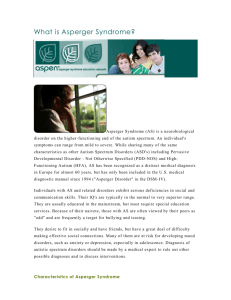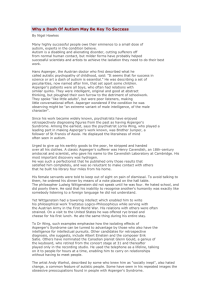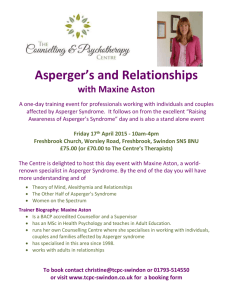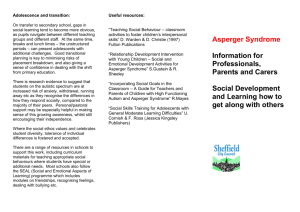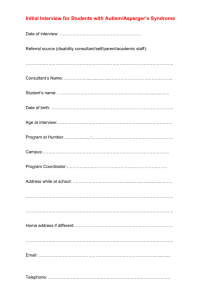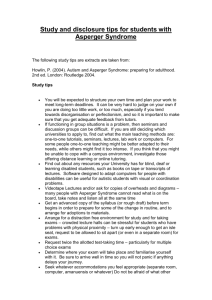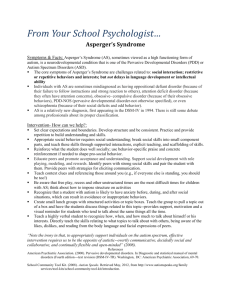File - Cassie Absher
advertisement
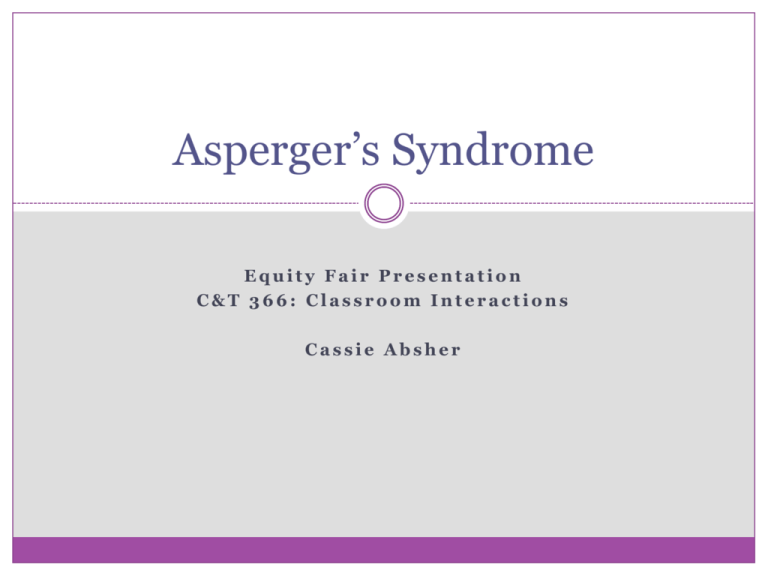
Asperger’s Syndrome Equity Fair Presentation C&T 366: Classroom Interactions Cassie Absher What is Asperger’s Syndrome? What is AS? Symptoms and characteristics of children with AS - Treatment Options - - What is Asperger’s syndrome (AS)? An Autism spectrum disorder – “Autism is a complex developmental disability that causes problems with social interaction and communication” (National Institutes of Health) Different from autism in that Asperger’s children typically have normal language and intellectual development Sometimes called “Aspies” May have coexisting conditions that require their own accommodations: ADHD Anxiety disorder Depression (especially in adolescents) Nonverbal learning disorder Obsessive-compulsive disorder Social anxiety (WebMD) Symptoms and Characteristics: Children with Asperger’s syndrome may… Not pick up on social cues and may lack inborn social skills, such as being able to read others' body language, start or maintain a conversation, and take turns talking Dislike any changes in routines Appear to lack empathy Be unable to recognize subtle differences in speech tone, pitch, and accent that alter the meaning of others’ speech. May not understand a joke or may take a sarcastic comment literally. Speech may be flat and hard to understand because it lacks tone, pitch, and accent Avoid eye contact or stare at others Have unusual facial expressions or postures Talk a lot, usually about a favorite subject. Have one-sided conversations or verbalize internal thoughts Have delayed motor development. May be late in learning to use a fork or spoon, ride a bike, or catch a ball. May have an awkward walk. Handwriting is often poor. Have heightened sensitivity and become overstimulated by loud noises, lights, or strong tastes or textures. (WebMD) Symptoms and Characteristics: Children with Asperger’s syndrome may… Obsess about having friends to prove they’re “normal” Desire for friendships and social contact but have difficulty acquiring and maintaining them Have difficulty understanding others’ feelings Have great difficulty with small-talk and chatter Have an urge to inform that can result in being blunt or insulting Have a lack of interest in other people and avoid social gatherings Shut down or withdraw in social situations (Hutten) Symptoms and Characteristics: Children with Asperger’s syndrome may… Not all symptoms and characteristics are negative! Pay attention to detail, sometimes with painstaking perfection Be able to focus diligently on an interesting task for a long period of time without supervision or incentive Have higher fluid intelligence The ability to find meaning in confusion and solve new problems, draw inferences and understand relationships between various concepts Be truly honest Exhibit independent or unique thinking and develop their own unique thoughts as opposed to a ‘herd’ mentality Have internal motivation, as opposed to motivation from praise, money or acceptance Work with a conscience and with personal pride Use logic over emotion when problem-solving Utilize visual and three-dimension thinking Be unaffected by trends, cliques or social standards, giving them pride in their own unique or eccentric style, interests or personality (Hutten) Treatment Options Communication and social skills training Cognitive behavioral therapy Medications No medications specifically treat AS Rather, medications treat specific symptoms such as anxiety, depression or hyperactivity Natural or alternative medicine/therapy Avoidance diets: gluten or casein-free diets Supplements such as melatonin, omega-3 fatty acids, vitamins Many Asperger’s children learn “how they work” as time goes on and often require less treatment as they get older (Mayo Clinic) Teaching Students with Asperger’s Syndrome - Special Interests - Teaching academics AND social skills - Possible challenges and solutions - Accommodations Special Interests Many individuals with AS have one or a few special interests which they are very knowledgeable about May obsess over these interests or talk about them excessively May be short term or long term Science and technology: Specific comic books, movies, television shows or novels Popular topics include: How can we help these students manifest these interests into topics of study or careers? Extremely detailed scenes Houses, cityscapes Animals Dr. Who Transformers Science fiction Superheroes Drawing and designing things Computers Mathematics and numbers The periodic table Astronomy (or just the names of stars) Meteorology (or the weather in general) Dinosaurs Groups of animals, such as insects Specific animals, such as horses or whales Trains, subways, busses, airplanes – schedules for public transportation systems or mechanics of the vehicles Japanese anime Role playing games (RPGs) , video games, card games Teaching Academics AND Social Skills “AS affects not only the student’s ability to learn academics, but also affects his ability to learn social-life skills, and oftentimes affects fine and gross motor skills” Social-life skills: paying a cashier, knowing where to turn for help, and knowing whether someone is truly your friend or someone trying to take advantage of you, advocating for oneself “These children do not learn the necessary semantic and pragmatic skills from simply being surrounded by a communication rich environment” “...these children are not antisocial. Rather, they are asocial—at times wanting to be part of the social world, but not knowing how to enter it.” (Wilkes) Possible Challenges: Bullying and teasing Case Study example: JEFF: This secondary school boy is described as ‘dangerous’. He’s brought a screwdriver into school and intends to use it against boys who, he believes, are teasing and bullying him. Original intervention: Staff threaten exclusion and, after investigation, find no evidence of bullying. BUT: What would the Asperger lens show us? Theory: Recognize the lack of subtlety in his social interaction. Understand his vulnerability to teasing and bullying, and intervene to prevent it. A specialist teacher observes ‘low-level’ teasing and bullying in corridors and yard, not apparent to school staff. Jeff has no strategies for ‘shrugging’ this off, or dealing with it with humor. He becomes angry, anxious, and isolated. New intervention: A welfare assistant, who has been given specialist training, is provided for Jeff at break and lunchtimes. He sees her as an ‘ally’. He is taught specific strategies for dealing with unwanted comments and approaches. “School life becomes easier for children with Asperger’s syndrome when the adults around them recognize the extent to which social demands result in stress.” (Wilkes) Accommodations Some normal classroom expectations may be too much for a student with AS: Keeping up with a fast pace Unmodified assignments Unexpected schedule changes Being on task all day long Heavy homework load These can cause stress, which can cause unwanted behaviors such as the student shutting down or refusing to work This student is most likely sending a message, NOT testing the teacher’s authority Accommodations Click here for a sample IEP, with goals and objectives, for a student with autism Why is this important to me? My younger brother, James Didn’t I say people with Asperger’s can be quirky?!!? Why is this important to me? My younger brother, James Actually, that’s a Halloween costume, but he is quite an eccentric guy About James Age 21 Diagnosis: grade 4 Also diagnosed with ADHD Took various medications during adolescence, but now only takes ADHD medication when in school Went to a special school for five years, then went back to public school when he decided he could handle it Currently in community college and deciding what he wants to do with life Possibly be a professional librarian Some special interests he’s had over his life include: Greek and Roman mythology Almanacs, World Records Philosophy Child psychology Card games (Yu Gi Oh, Pokémon, Magic the Gathering) Computer programming Etymology Interview with James What were some things that teachers in (public) school did that helped you? Listening to what I asked for, such as being able to leave uncomfortable situations, and not putting me in situations where I would be uncomfortable. For example, if the class was doing oral presentations and I was too nervous, they would let me give it to only them rather than the whole class. …that hindered you? Please don’t ever tell me to do something “because I said so” or “because those are the rules.” The Asperger’s says, “why?” I’m asking why for a reason, not just to ignore the crap out of the teacher. (Absher) Interview with James What are some things you want teachers to know about Aspies? My questions aren’t unnecessary, they’re things that I think need to be answered. We’re reluctant to work in groups – we prefer someone else to take control and to have specific instructions. A lot of us have no mental filter. Tell me nicely if I’ve done something inappropriate and what that was, and tell me to look up the origins as to why it’s inappropriate. What can teachers do to help Aspies be successful in the classroom? Give pre-defined learning objectives and don’t deviate from them. Sudden schedule changes are s***! See? No filter… but James knows the difference between family conversation and those at school or in public What are the ways that you learn best? Labs, hands-on activities, getting up and moving around the room. Making flashcards with pre-defined lists of words or concepts. Having instruction materials like lecture outlines or Powerpoints available for personal use. (Absher) Interview with James Why do you like your long hair and beard? In high school, people would always come up to me in the hallway – people I didn’t know – and start talking to me and telling me all this stupid gossip and stuff I didn’t care about. After I grew my beard, that stopped. I would rather initiate social situations. Now I just like it, and I’m lazy and it takes too much effort to shave. Also I like to run my hands through it while I have deep philosophical thoughts. What about the tie dye? It’s colorful and makes me happy. I take pride in my quirks. It means I’m unique. (Absher) Interview with James’s Mother From a parent’s perspective, what were some things that teachers did that helped your child? One teacher was really good about calling at least once a week - every day if necessary – to let me know if there was anything that happened that she wanted me to know about before he got home. …that hindered your child? His fourth grade teacher was just terrible. She truly believed that there was nothing wrong with anyone, they’re just brats. She actually called him a brat! I homeschooled him for a half of a year while we waited for the IEP because she was totally not understanding. What advice would you give teachers concerning interactions with parents of Aspies? Sit down and talk to the parent to gauge their situation. How are these parents handling their autistic child? Saying things like “how would you like me to proceed with this situation?” and following the IEP. (Pasquini) Citations Absher, James. Personal interview. 10 Nov. 2012. "Asperger's Syndrome - Symptoms." Autism Spectrum Disorders Health Center. WebMD, 12 Apr. 2010. Web. 4 Nov. 2012. <http://www.webmd.com/brain/autism/ tc/aspergers-syndrome-symptoms>. "Asperger's syndrome: Treatments and drugs." Mayo Clinic, 18 Nov. 2010. Web. 6 Nov. 2012. <http://www.mayoclinic.com/health/aspergers-syndrome/DS00551/ DSECTION=treatments-and-drugs>. "Autism Spectrum Disorders (ASDs)." National Institute of Child Health & Human Development. National Institutes of Health, 15 Nov. 2011. Web. 5 Nov. 2012. <http://www.nichd.nih.gov/health/topics/asd.cfm>. "Examples of IEP Goals and Objectives Suggestions For Students With Autism." Cooperative Educational Service Agency No. 7. Web. 5 Nov. 2012. <http://www.specialed.us/ autism/05/g_o.htm>. Hutten, Mark. "List of Aspergers Characteristics." My Aspergers Child. Jan 2011. Web. 6 Nov. 2012. <http://www.myaspergerschild.com/2011/01/list-of-aspergerscharacteristics.html>. Pasquini, Zelda. Personal interview. 10 Nov. 2012.
